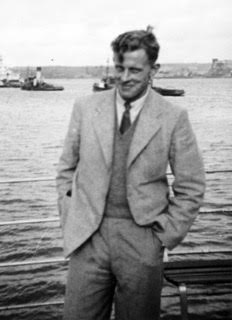Shades of the Great War are all around us (1)

The Temple Church in Redcliffe, Bristol, founded in the mid-12th century, was bombed in November 1940 during the Bristol Blitz. More than 80 years later it still stands as a ruin
When I was born, in 1946, the Second World War had only just finished but my childish memories of its impact are still vivid. Rationing wasn’t completely abolished for another eight years. I think I remember car parks in Bristol which seemed to have been made out of enormous bomb craters.
And some parents had vivid stories to tell: my mother seemed to have enjoyed her times in the WRNS, in safety in Scotland, while, disturbingly my father told atrocious stories of how he and his tank crew had dealt with the Japanese in Burma. Other parents, of course, never spoke of those days.
I never tired of endless WW2 films and devoured books
of PoW escape stories. Though that may have been my own escapism from a
succession of ghastly boarding schools.
But WW1? There’s a strange gap in my memories. No
grandparents seemed to have fought or even done heroic deeds in the equivalent
of WW2’s Home Guard.
Wilhelm II, Emperor of Germany and King of Prussia: the villain of World War I?
For me WW1 remained mysterious. A senseless slaughter
on all sides. Kaiser Wilhelm never had the frightening stature of WW2’s ranting
bogeymen Hitler and Mussolini. And the
Gestapo and Germany’s
brutal persecution of the Jews were associated in my mind with sadistic
boarding school bullies.
So in 1995, maybe to get back at the bullies, I wrote
a book about WW2’s impact on the small town of Oundle in Northamptonshire.
Twenty years earlier, however, we had bought our first
house. There must have been a mania for
stripped pine, for we set to work scraping off all that dark brown stain and
woodgrain - the gloomy grey-green varnish which was supposed to look like
finely grained wood.
Beneath the stain which covered some tongue and groove
panelling on the first floor landing we found the name H.B. Hancock and the date 1912 etched into the
wood. The decorator had obviously left his mark. Out of respect we left it.
Oundle's war memorial and the Talbot Hotel, a drawing by Diana Leigh
It was a few years later that while passing the town’s
war memorial I noticed our decorator’s name and the date of his death:
1917.
The Battle of Arras: a photo dated 24 April 1917. A battery of 18-pounder field guns under German fire
close to Monchy-le-Preux. In the foreground is an advanced dressing station.
Oundle man Harry Baxter Hancock would die four days later
Thanks to the internet I can now read fuller details:
Harry Baxter Hancock
Private, 24422, 11th (Cambs) Suffolk Regiment. Killed in action Roeux
28-04-17. Born, enlisted and resident Oundle. Commemorated on Arras Memorial, Bay 04.
Elsewhere I found an item from the Northampton Mercury for 24 Aug 1894. It reported that his father James Harry Hancock, of Oundle, also a painter and decorator, "for neglecting to have his child, Harry Baxter Hancock, vaccinated, was ordered to pay 6s. costs and have the child vaccinated within 14 days."
I hope the new owners of our Oundle house have kept
that little bit of panelling as we left it.
Four years after settling in Budleigh Salterton I got
an email out of the blue from a Joseph Byrne, writing from Ireland. He’d found me via a Cape
Cod website. Isn’t the internet amazing! The ghosts of the past can use it to help us
tell their stories. Again, I found myself investigating the sad death of
another victim of WW1.
You can read about him in a future installment, which will appear on the following site at http://fairlynchgreatwar.blogspot.co.uk/
I’m calling the site The Great War at
Fairlynch and over the next four years I reckon I’ll be spending a fair bit of
time there, and less on Budleigh & Brewster.







Comments
Post a Comment